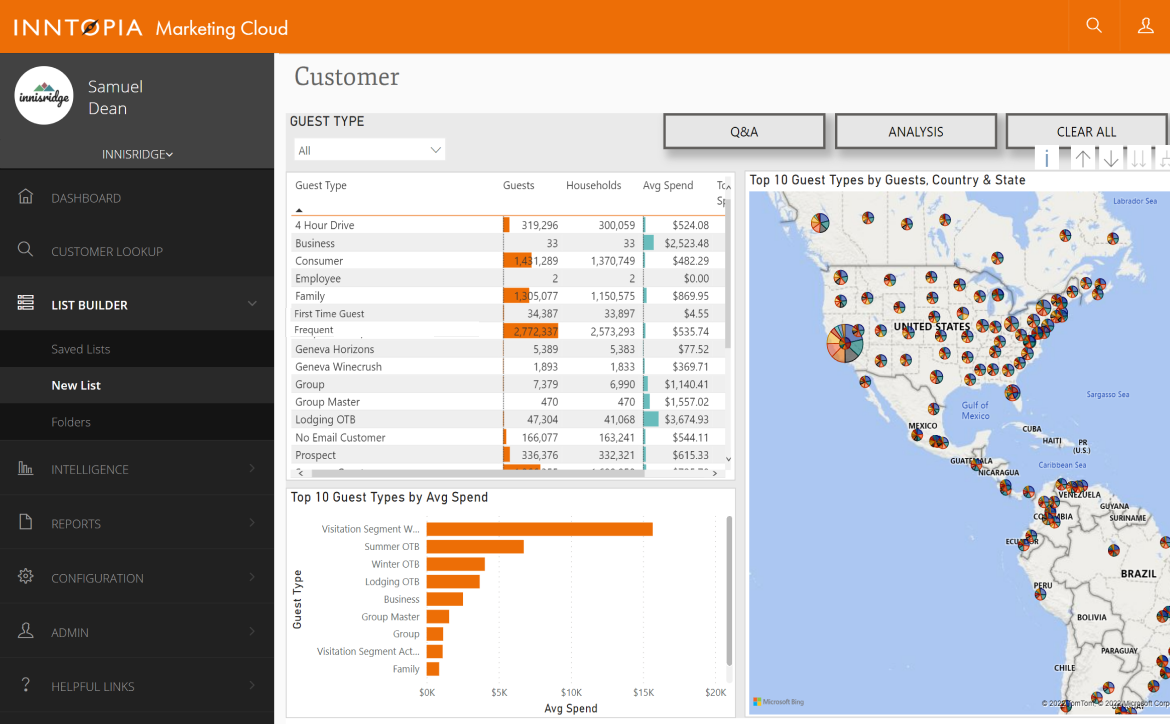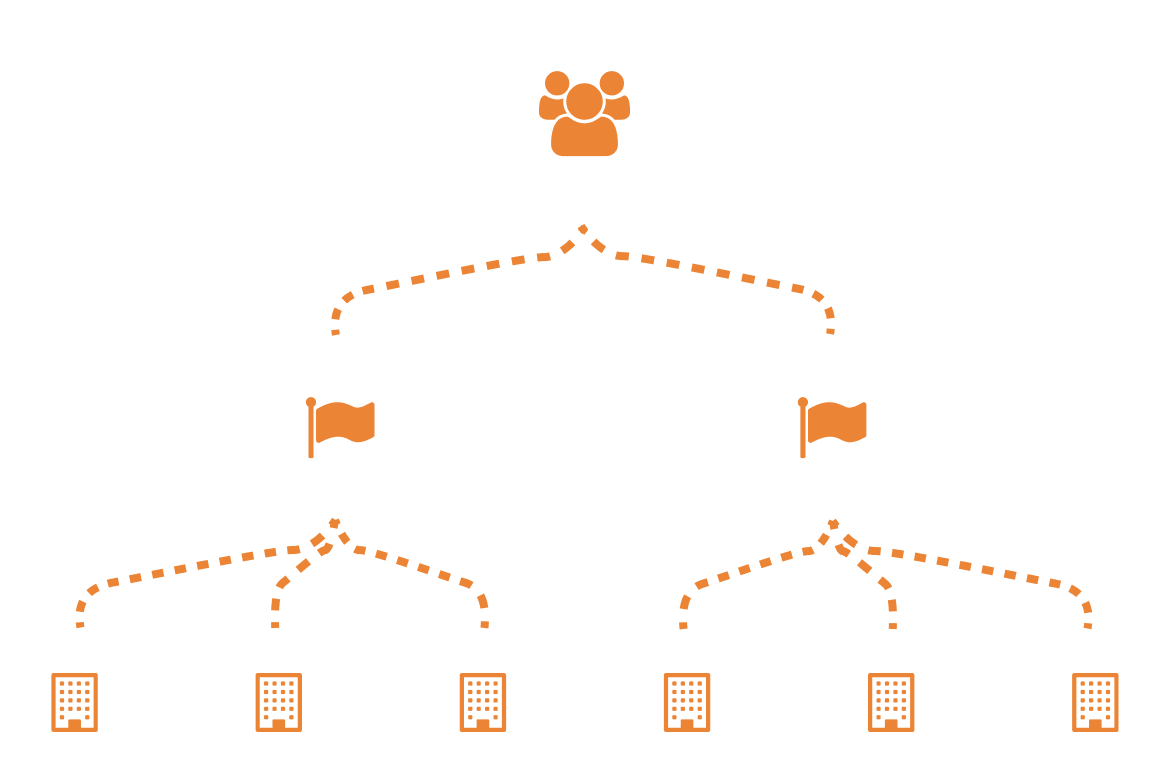Tools & Guides
We’re written about both hotel CRM and resort CRM, but we wanted to also break this out by something that’s both an umbrella for these other angles as well as a unique angle by itself within the travel industry. CRM, which stands for customer relationship management, is another term that is both broad but also unique. Let’s begin by understanding both of these pieces before combining them to better understand how a CRM like Inntopia Marketing Cloud fits into this world.
The travel industry is one that comes with a unique combination of traits. On the one hand, hospitality implies a level of one-to-one interaction between a host (hotel, resort, restaurant, etc.) and a guest (family, business person, couple, etc.). Whether it’s being welcomed at the front desk and guided to their hotel room, being able to order “the usual” without the need for follow up questions, or welcoming a family back for their annual retreat, the word “hospitality” invokes an image of a relationship and interaction.
Yet most hospitality brands have to operate at a scale where they will never be able to know each guest by name. Maybe in the days of a 5-bedroom bed and breakfast it was more possible to know each guest personally, but in a hotel industry where average room counts soar into the hundreds in many markets, that simply isn’t a possibility. The same is true for restaurants that need to be open 7 days a week from 11am – 9pm in order to be profitable. The scale of guests required means that, yes, there will be a group of regulars, but those regulars will never be enough.
Even more, many hospitality brands eventually franchise or grow into multiple locations, creating another layer of disconnect between much of the brand’s staff and the guests the serve.
It’s this tension – one to one interaction with guests and the scale required to be successful, that creates the need for purpose-build, hospitality CRM software. Typical CRM software in other industries is often focused on smaller scale, one-to-one interactions. They’re also built on very simple customer data sets where data may be flowing in from a single, standardized source with all transactions originating through the same interface and system.
However, this sort of generic customer relationship management software is really good at keeping tabs on specific guests, tracking every interaction between them and a brand, and surfacing key behaviors, traits, and preferences that can be capitalized on by a sales team, account manager, support team, or any other representative of a brand.
In other words, even though these CRM platforms aren’t exactly what a hospitality business may need, they have many pieces in place.
It’s when software combines the strengths of the idea behind CRM with the unique needs of hospitality that hospitality brands can find that balance between personal interactions and the scale required to run a successful business in the hospitality industry. There are five key features that the best hospitality CRM platforms all have in common.
First is the ability for a hospitality CRM to merge guest data from as many systems as the brand might be running. For example, that might be a property management system (PMS) with guest booking data, a restaurant point of sale system (POS) with guest dining data, a customer loyalty system with behavioral data, and surveys with guest satisfaction data. A hospitality CRM can combine all of these traits and behaviors into a single guest database with clean, accurate guest profiles.
Next, a hospitality CRM will allow for fast, tiered access for every member of staff member within your hospitality business. For example, a concierge can have a tool to quickly look up guests and see their spend history, the marketing team can look across all guest profiles to build segments of similar guests for broader outreach, the call center can see these profiles in a module alongside their reservation while booking, your social media agency can see a commenter’s booking history before replying, and guest service teams can tease out which VIPs are arriving today and see those profiles in a dashboard as they prepare for the day.

Again, the tension is between wanting personalized interactions with each guest and the number of guests required to be successful. Innovations around marketing automation and service automation tools have been able to build this bridge. Whether there’s an intentional delay built in or messaging is triggered in real-time, automation can use guest behaviors like check in, a negative review, lack of bookings, and more as triggers to send email marketing and SMS (text messaging) to engage guests with customized, relevant messages that are extremely close to what a human would do. But because they’re automated, theses bits of guest communication and marketing campaigns can be deployed at scale.
One of the upsides of scale is that you get statically significant datasets to work with as you analyze patterns with marketing engagement, loyalty programs, and guest satisfaction. A hospitality CRM will give you a birds-eye view across guest behavior of trends, patterns, and changes in your guests’ interaction with your brand. This is extremely helpful when trying to decide if a marketing campaign actually generated guest bookings, but it’s also helpful for understanding if the investment you made in more servers, staff, and agents lead to an increase in guest satisfaction and loyalty. A hospitality CRM platform will allow you to see these industry-specific metrics in ways a traditional CRM like Salesforce or Hubspot simply can’t.
Whether this is a dedicated module with the CRM or something you can accomplish simply by having guest information in a central, accessible system, a hospitality CRM will be able to help your team achieve the scale they need to be successful by helping identify, reach, and convert potential customers into loyal guests. Even more, it will identify current guests or recent guests who have the potential for upsell. For example, if you sell multiple, complimentary experiences to your guests and a recent customer only booked one of those, your CRM platform should be able to trigger an automated email campaign promoting the other products to the guest in a seamless, easy-to-purchase way to maximize the revenue, and satisfaction, of every guest. Even further, you should be able to identify soft spots in occupancy or performance the help pinpoint these messages.

As we’ve alluded to a few times, not all CRM software is created alike, and this is especially true for the hospitality industry. When shopping for a hospitality CRM, there are five major issues that businesses will face.
The biggest issue with many hospitality CRM platforms is simply the one-size-fits-all framework they’re built on. The problems is that no two guests are alike which means no two hospitality businesses are alike. Forcing you to use the same email templates, guest traits, and analytics as everyone else limits your ability to serve your guests in a way that’s aligned to your unique model and guest experience.
When guest data lives is multiple systems, it’s not enough to get data out of just a one or two of those platforms. You need all of the guest data if you’re going to uncover all of the opportunities for guest service. And this is true for systems beyond your POS and PMS, if you don’t have survey data you won’t know how satisfied they were after that last booking, if you don’t have email marketing engagement data you won’t know if that campaign got them to book, if you don’t have social media data you won’t know the size of the influence (and risk) of an unhappy guest who had a bad experience.
A hospitality CRM isn’t just for marketing, it’s for everyone. If your sales team can’t integrate guest information into their sales process, for example, you’re missing huge opportunities. Likewise, if your front desk staff or room service staff can’t understand the guest who just requested an upgrade or special style of service, they’re missing moments throughout the customer journey to provide guests with the type of experience that can ramp up your guest satisfaction and return rates.
Just like you want well-trained staff to build and maintain guest relationships in order for them to maximize their experience at your hotel or resort, your hospitality CRM provider should take a similar approach to help your team maximize their experience with the software. This staff should have experience being in the shoes of hospitality professionals and have project management skills to truly act as an extension of your team and not a hurdle in the way of success.
Multiple studies have shown that the primary reason customer relationship management initiatives fail isn’t because of the technology, it’s the lack of support. CRM platforms are complex, so hospitality businesses that are budgeting for a CRM system need to budget for support as well or they’ll be walking into a situation where they’re destined for either below-average results or total failure.

Finally, one of the biggest problems is the lack of ability to look across properties or locations. Because, going back to the need to scale, many hospitality brands are made up of many locations. In this case, a CRM that can’t give your team access to guest data at both the individual property and aggregated, brand-wide level will be leaving opportunities on that table to monitor guest behavior patterns between locations and build brand-wide loyalty programs and performance metrics based on guest data and guest behavior.
Before we wrap up, it’s important to touch on one key point. Similar to buying appliances or vehicles, there is certainly an upper limit where spending more on your CRM software won’t get you anything extra. At least not anything necessary. However, there is also a lower limit where skimping on a CRM system will leave you with a tool that is more trouble than it’s worth. Pricing doesn’t tell the whole story, but it’s an important thing to be able to look past.
For example, a hotel hoping to spend $500/mo for a CRM system is almost certainly going to end up with a tool with terrible support, basic automations, and little to no customizations. However, if that hotel were to increase their budget to a price of $1,000/mo or $1,500/mo is small in the grand scheme of things but will open the door to buy a CRM tool that gives their entire team quick, easy access to guest data, opens the door for advanced marketing automations, comes with deeply-experienced customer support teams, and multiples the revenue and ROI they get out of the system 5x-10x even though they’re only paying 2x the price.
By far the biggest mistake we see hospitality brands make it paying for a budget CRM and expecting to get premium results for both their team and their guests.
In the end, what your hospitality business needs is a customer relationship management system that is purpose-built for the unique needs of the hospitality industry. You need a CRM that gives you the ability to:
And do so in a way that doesn’t leave you without the tools you need to succeed like experienced support, customization options, service-focused tools, deep PMS and POS integrations, and tiered data structuring.
This is what Inntopia Marketing Cloud can do. We’d love to show you around.